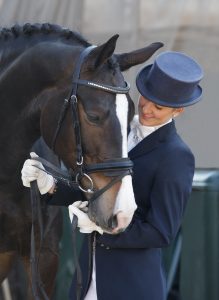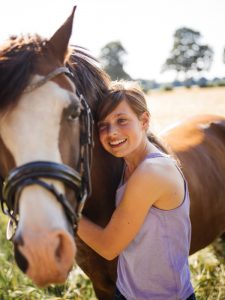Being in the wrong job is miserable. If you’re stuck in an office when you’d rather be outside, or crunching numbers when you’re longing to be creative, you’ll know what it’s like.
So, what’s it like for a horse to be in a similar situation? Obviously, horses don’t grow up dreaming of career paths, even if they’re bred to race or have top showjumping or dressage bloodlines. But because their owners choose what they do, there are times when horses can be square pegs in round holes and owners need to think about their horses’ needs rather than  their own ambitions.
their own ambitions.
There are racehorses who don’t want to race, dressage horses who go sour at the sight of white boards and showjumpers whose pedigrees spell out the promise of ability but who appear to have very little in real life. How much of that is due to poor training, over-drilling and/or bad experiences is another topic for debate.
Likewise, how many disappointments are down to riders who buy an expensive horse with the magic P-word – potential - but don’t have the experience or talent to bring it out?
The flipside is the riders who spot special talent in a horse who just wasn’t meant to do what he’s doing, let alone do it so brilliantly. Steph Croxford’s unlikely dressage star, Mr President, was part Hackney, part Gelderlander and part warmblood and was meant to be a driving horse. He – and, fortunately, Steph – realised that his talents belonged in another area.
Then there are the ponies who somehow find the scope to power around huge courses, or even reach the top in eventing: horses like Marion Coakes’ showjumper and Olympic silver medallist, Stroller, or Karen O’Connor’s Theodore O’Connor (Teddy), a 147cm pony who was part Thoroughbred, part Arab and, unbelievably, part Shetland pony. The latter pair was shortlisted  for the USA Olympic team but sadly, Teddy had to be put down after a freak accident at home.
for the USA Olympic team but sadly, Teddy had to be put down after a freak accident at home.
Unfortunately, horses who defy the odds are much rarer than horses who fall foul of them. While any horse should be capable of working in balance on the flat and over schooling fences, there are times when the two halves of a partnership are best suited to different things.
In that situation, there are two options. One is to find the horse a new home with a like-minded rider. The second is to switch your focus to the area in which your horse excels – and some people prefer to do that rather than part company. Either way, you both need to be happy.
If you’ve switched disciplines to keep your horse happy, or have uncovered unexpected talent, we’d love to hear about it!











